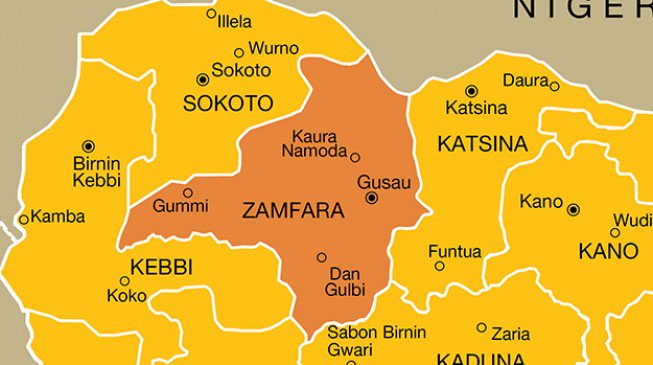
By Shola Ilesanmi.
On September 3, 2021, the Nigerian Communications Commission (NCC) directed all telecommunications providers to shut down services in Zamfara State in response to the growing spate of insecurity in the state, especially kidnapping and banditry. While the decision was to further enable security forces tackle the threats, there are indications it might create information blackout in the state and stoke the spread of misinformation among residents.
The move was also said to have been based on the request of Zamfara state government following a resolution of its state security council. According to The Guardian, a letter dated August 3, written to the NCC from the office of Zamfara State Governor, asked for the shutting down of telecoms service in the state.
However, it was only a matter of days before the shutdown was extended to over 13 local government areas in neighbouring Katsina state as confirmed by local authorities.
Zamfara state as Epicenter of Banditry in Nigeria?
Zamfara, carved out of Sokoto state in 1996, has had a fair share of Nigeria’s insecurity menace in the past decade, leaving thousands dead, hundreds of thousands homeless, and the figure of orphans and widows increasing everyday across the country.
A report by Proshare quoted the NBS National Corruption Survey for 2017 as revealing that crime and insecurity was the most important issue affecting Zamfara state at that time. Four years down the line, the situation has not improved even though there have been at least three presidential directives on the deployment of troops to arrest the perpetrators and restore peace to the state.
In spite of this, kidnappings have continued to thrive in Zamfara with the most prominent being the abduction of more than 200 schoolgirls in the town of Jangebe in February. The schoolgirls were later freed after a ransom was reportedly paid, an allegation denied by authorities. Worried by this trend, the state government ordered total closure of schools two days before the telecommunication shut down was to take effect after gunmen had made away with many students during an attack on Kaya Day Secondary School in Maradun Local Government Area of the state, five days following the release of some students of the College Of Agriculture and Animal Science Bakura earlier abducted by bandits.
Security operatives have also not been spared of the venom of the blood spilling bandits with the latest being the death of 12 military personnel during an attack on a military base on September 12, 2021.
What is telecom shutdown
The NCC announced a shutdown of telecom services, but because their operations are largely interwoven with the internet, it’s safe to say that what is being experienced in Zamfara and adjoining local governments in neighbouring states is a total internet shutdown.
A shutdown of telecoms operations in any area means disconnection from their services, such as wireless communication networks that allow transmission of data in words, voice, audio, or video. This basically makes it difficult for residents to make phone calls and access the internet as the situation was several years ago before Nigeria’s first telecoms firm began operation.
According to AccessNow, an international NGO that focuses on digital rights, an internet shutdown is “an intentional disruption of internet or electronic communications, rendering them inaccessible or effectively unusable, for a specific population or within a location, often to exert control over the flow of information.”
Trajectory of Telecoms shutdown amid growing insecurity in Nigeria
The decision to halt telecoms operations in Zamfara is not allien in Nigeria. A similar situation occurred on May 15, 2013, where there was a shutdown of mobile phone signals in many parts of three northeastern states of Borno, Yobe and Adamawa. The move was part of a military offensive against Boko Haram Islamists following a state of emergency earlier imposed by former president Goodluck Jonathan in the affected areas.
To communicate during the blackout and since it was only GSM lines that were blocked, the police developed an alternative mobile communication system using Code Division Multiple Access (CDMA) on Global Open Trunking Architecture (GOTA) from the Chinese manufacturer ZTE. This enabled them, alongside other state security units, to find a way around the shutdown.
Journalists and other providers of essential services had to travel to areas with internet services to take their turns to send emails while others resorted to the very expensive alternative of Thuraya Satellite Communication.
The shutdown which came with mixed feelings for stakeholders, however, lasted until mid July 2013.
Mixed reactions greet latest Telecom shutdown
As expected of every pronouncement of the government, there were mixed reactions on the implications of the shutdown on the socio economic wellbeing of residents and even outsiders.
A report by the News Agency of Nigeria, NAN, indicated that residents of Kebbi, Sokoto and Katsina states said they are ready to bear the socio-economic costs of the telecommunication shutdown in neighbouring Zamfara State, if the measure would get rid of bandits.
However, the Socio-Economic Rights and Accountability Project (SERAP) urged the federal government to immediately reverse the ‘apparently unjustified suspension’ of internet and telecommunication networks in Zamfara State, and 13 local government areas of Katsina State, saying this is inconsistent with the principles of necessity and proportionality.
Also, the Media Rights Agenda while describing the directive as “unwarranted,” said “there is no evidence anywhere in the world that shutting down communication services, including access to the internet and telephone communication, helps improve security, prevent terrorist attacks, or to stop them.
Beyond these concerns, evidence has emerged that the decision could create an information gap between the government and the residents, thereby causing uncertainty about the war against insecurity. In situations such as this, people take advantage of the shutdown to create pannick and spread misinformation among residents who now rely on one-way traditional media.
Shut down and Misinformation
For instance, on September 7, 2021, a Facebook post claims that eight police officers had been arrested in Zamfara for their alleged involvement in banditry. The claim in no time became a feast for peddlers of unverified information. Ideally, the next thing was for fact-checkers to get down to business to verify the claim as it could incite violence against the police and dampen the existing trust between residents and government forces who are in charge of battling the criminals.
However, verifying this claim might be more difficult than envisaged, as most independent and objective local sources have been cut away from the rest of the world due to the shutdown.
Relatedly, an APC chieftain and top official of the Lagos state government, Joe Igbokwe, shared a Facebook post in which some children, men and women were under panic as gunshots could also be heard and depict insecurity in Zamfara. In less than 24 hours of making the post, it was shared by over 150 people and viewed by over 4,700 people.
Similarly, another facebook user, Labarin Gaske, posted on September 8 and 12, 2021 two videos which both painted a scary warlike situation in Zamfara State. One was captioned Zamfara on fire while the other tagged Zamfara also showed scores of men in Nigerian Army uniforms alongside those in casual dresses carrying ammunition and making some utterances in Hausa language.
The implications of the shutdown are, therefore, far reaching, and could make one wonder if this was not a case of solving a problem to breed another, especially on the heels of the dangers that lurk around the corner when the information ecosystem is altered to suit anti-societal, evil, manipulative, egoistic and divisive purposes.
The Director of Defence Information, Maj. Gen. Benjamin Sawyerr, said the suspension of GSM service had helped to block the leakage of information to the bandits.
However, there are other sides to the claims of the defence authorities about the undertones of the shutdown on stability in the state and the region by extension.
To understand historical context of telecom shutdown in the past on information ecosystem,
A study of “Silencing Boko Haram: Mobile Phone Blackout and Counterinsurgency in Nigeria’s Northeast region”, revealed that while the military’s decision to shut down mobile telephony was ostensibly meant to disrupt Boko Haram’s communication capabilities, it was seen by Nigerians primarily as another form of state disruption of their means of communication and private lives to fulfill short term political exigencies.
The study further deduced that with constant uncertainty on information flow that had impacted the pattern of social relationships, the mobile phone shutdown further heightened insecurity in the northeast region at that time.
Also, a freelance journalist covering the northwest region for HumAngle Media, Abiodun Jamiu, said although the stringent measures such as the shutting down of telecommunication services employed by the Nigerian government to finally decimate terror groups plaguing the northwest has been adjudged to be effective. Nonetheless, it has further encouraged the spread of false information in the region.
He added that due to the proliferation of the new media, fake news peddlers now have a field day while sourcing credible information or fact is more difficult for journalists.
AFP fact-checking journalist, Segun Olakoyenikan, explained that while the efforts might be effective in distorting the flow of communication to the bandits, it could be counterproductive in the fight against misinformation.
According to Olakoyenikan, “Misinformation thrives during crises and could even get worse if access to information is cut off completely. As it stands, Zamfara residents have no choice other than to revert to radio and television in order to stay abreast of happenings within their locality, but that then creates a bigger challenge for journalists.”
He added that due to the disruption in digital communications, it would become very challenging for fact-checkers to monitor and debunk fake news, as well as exchange official correspondence from appropriate quarters on false claims.
“Fake news is dangerous and if allowed to thrive, it could worsen even the best efforts against insecurity,” Olakoyenikan said, adding, “The fact that the chain of fake news verification process is temporarily broken is not an excuse to let misinformation flourish, this is where journalists and fact-checkers have to be more creative in discharging their duties. (Dubawa)















